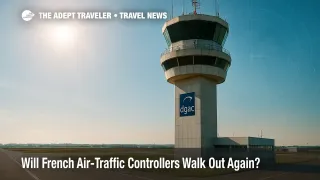Will French Air-Traffic Controllers Walk Out Again This Summer?

French air-traffic controllers shut down large parts of France's airspace on July 3 - 4, canceling up to half the flights at key airports and delaying thousands more across Europe. Although no new strike notice has been filed since, union leaders warn that further walkouts remain "highly probable" if talks with the civil-aviation authority stall. Travelers bound for - or merely over-flying - France in the coming weeks should monitor conditions closely and adjust itineraries before airports clog again.
Key Points
- July 3 - 4 stoppage cut 25 - 50 percent of flights at 11 airports.
- Unions UNSA-ICNA and USAC-CGT cite chronic understaffing and "toxic" management.
- No fresh dates announced, but unions say more action is "on the table."
- DGAC must give five-day public notice before any new strike.
- Why it matters: France sits beneath 70 percent of Europe's short-haul routings, so a French ATC strike ripples continent-wide.
Snapshot
French air-traffic control (ATC) employs roughly 4,000 controllers who manage the busiest airspace in Europe. When even a minority of them strike, the Direction Générale de l'Aviation Civile (DGAC) orders airlines to slash schedules pre-emptively to keep the remaining system safe. During the July walkout, Paris-Charles de Gaulle and Paris-Orly each cut one quarter of departures, while Nice, Bastia, and Calvi cut half. Overflights between the United Kingdom, Spain, Italy, and Germany diverted around French airspace, adding mileage, fuel cost, and cascading delays. Because EU regulation views ATC strikes as an "extraordinary circumstance," compensation is limited to rebooking or refunds, leaving travelers to absorb meals and hotel costs unless covered by travel insurance.
Background
Controller militancy is not new. France averages six ATC walkouts per year, largely because retirement-age controllers cannot be replaced quickly enough to cover escalating traffic. The pandemic hiring freeze deepened a staffing trough that unions say will last until at least 2028. A stalled €2 billion modernization program and a controversial 2026 "clock-in" rule - intended to verify that every controller is at position before traffic peaks - inflamed tensions. In April 2025 an internal safety audit blamed a near-collision at Bordeaux on "systemic fatigue," giving unions fresh leverage. Management argues that 2023 pay rises already outpace inflation and that adding trainee controllers before simulator capacity expands would jeopardize safety.
Latest Developments
The two-day July strike was a tactical warning shot rather than a full blockade. What happens next depends on three parallel tracks:
July Walkout Recap
- Up to 1,500 daily cancellations, affecting roughly 300,000 passengers.
- Ryanair lost 400 flights; easyJet reported a £15 million earnings hit.
- Long-haul carriers (Air France, Delta, Emirates) protected intercontinental rotations by downgrading short-haul frequencies.
- DGAC required airlines to publish reduced schedules 48 hours ahead, limiting last-minute confusion.
Union Demands
UNSA-ICNA's 23-June press release outlines three red-line issues:
- Hiring: 180 additional controller positions per year through 2030.
- Modernization: Fast-track the delayed 4-Flight radar-data-processing suite.
- Staffing Protocols: Withdraw the 2026 clock-in mandate, which unions label "punitive." USAC-CGT echoes those points and adds a 10 percent pay-scale revision.
Negotiation Outlook
Transport Minister Philippe Tabarot opened mediation on July 10 but offered no new money, instead proposing task-force reviews on staffing and modernization timelines. Union delegates called the offer "symbolic" and warned of "rolling stoppages" in late July or August if concrete progress is not visible by July 25. Under French labor law, unions must file a new strike notice at least five calendar days in advance, so the earliest a fresh walkout could occur is July 31. Airlines, led by easyJet and Ryanair, are lobbying the European Commission to fast-track "Single European Sky" reforms that would allow overflights to bypass French controllers during national strikes.
Analysis
For travelers, the biggest risk is not a domestic French itinerary but any routing that crosses French airspace. A Boston-to-Rome flight, for instance, may add 250 miles and 40 minutes by diverting over the Bay of Biscay or the Alps, burning fuel and breaking tight onward connections. Because compensation rules offer little cash relief, prevention beats reclamation:
- Fly early in the day. Morning banks clear before ripple delays build.
- Build long layovers. Allow at least three hours for intra-Europe connections.
- Consider rail. Paris-Lyon and Paris-Brussels high-speed trains substitute neatly for short-haul flights.
- Book via travel advisor. A professional can reticket quickly if schedules shift. (See Adept Traveler's detailed July 3 strike recap for real-time examples.)
Well-timed contingency planning also helps airlines. British Airways up-gauge of Heathrow-CDG rotations to 777-200s during the July strike preserved passenger capacity despite a 40 percent frequency cut - a template likely to repeat.
Final Thoughts
While no second strike date is locked in, union rhetoric and slow negotiations point to further disruption this summer. Monitor DGAC bulletins five days before travel, pad itineraries, and keep travel-insurance contact numbers handy. By planning around potential French ATC strikes now, travelers can safeguard hard-earned vacations and keep Summer 2025 skies - and schedules - as smooth as possible. France air-traffic control strike.
Sources
- [Préavis de grève UNSA-ICNA, July 3 - 4 2025] (https://icna.fr/publication/bn_23juin25_communique_de_presse.pdf)
- [DGAC Info'Veille No. 4667, July 2 2025] (https://www.e-lettre-dgac.developpement-durable.gouv.fr/info-veille/2025/4667/rubrique79060.html)
